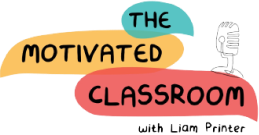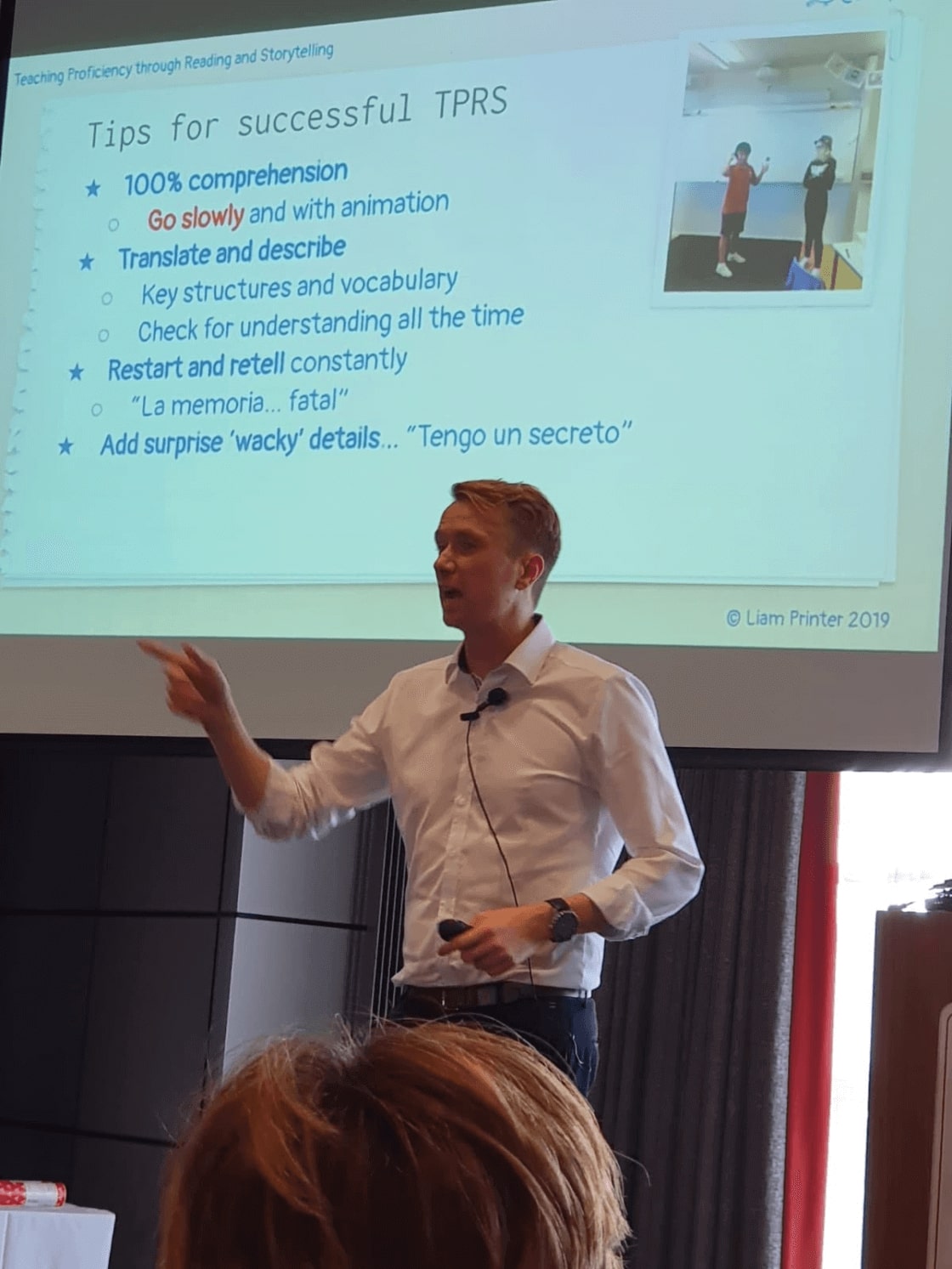If you are a language teacher based in Europe you must get yourself to Agen, France next summer for the next instalment of this incredible week of meeting, laughing and sharing with like-minded passionate teachers. I am sure most of you have been to ‘professional development’ workshops before that left you far from… well, ‘developed’. This workshop is different. You walk away feeling professionally enriched, enthused, motivated, supported and connected.
When I first heard about the Agen TPRS workshop, I was excited to have the opportunity to meet and learn from amazing teachers from around the world but I was a little apprehensive that it was for an entire week in the middle of my long awaited summer holidays. I arranged to attend the conference from Monday to Friday morning, planning to leave at lunchtime. However, after just a few days I could see why people love this week so much. The workshops, the presentations, the activities but even more so, the social aspect… picnicking in one of Agen’s beautiful parks as the sun was going down, chatting about pedagogy and motivation with other like-minded souls. I was sold. I was all in. I quickly cancelled Biarritz and booked the Friday night in Agen too so I could attend every session right up to the final one on Saturday morning.
The workshop focuses on teaching strategies related to Dr. Stephen Krashen’s ‘Comprehensible Input’ (CI) theory and the method of ‘Teaching Proficiency through Reading and Storytelling’ (TPRS). The fundamental principle of CI teaching is to give students vast amount of ‘input’ (through listening intently and reading) at a level that is close to 100% understandable so they acquire language naturally rather than having to ‘learn’ it through drilling and practising. The results that CI teachers are achieving in a short amount of time are astounding… but the more important part, for me at least, is that CI students adore their language class; they find it fun, entertaining and are highly motivated to speak the language outside class and to continue learning it into the future.
This isn’t just anecdotal either… the research around TPRS and CI points to increased retention and numbers of students taking the language. As part of the Doctorate in Education that I am completing with the University of Bath, my research study with 12 high school students (full text here) found that TPRS was highly motivating to them and led them towards feeling intrinsically motivated – learning Spanish out of pure joy and interest rather than because of extrinsic rewards. Surely this has got to be our core goal as teachers. For our students to not only acquire language rapidly and achieve their potential, but to love our subject so much that they can’t wait to use their learning outside class and are eager to keep learning more about it long into the future.
Susan Gross kicked us off with a witty, engaging, keynote address about the history of CI and TPRS on Monday afternoon after an ‘official welcome’ to Agen at the Mairie. For those who have not been to the Agen Workshop before, the mornings are ‘language labs’ where you can be part of a real language class for the week or simply drop in and observe some exceptional teachers, hand picked from around the globe, working their magic. The afternoons are dedicated to workshops and presentations focusing on various strategies that aim to increase our use of CI in the classroom by sharing our practice with one another.
During the week, I had the pleasure of attending a Japanese class with Pablo Ramón, French with Sabrina Janczak, Spanish with Margarita Pérez Garcia, Mandarin with Diane Neubauer and Breton with Daniel Kline Longsdon Dubois. In my current school we have an open door policy where we encourage anyone to come along and observe but the reality of a busy school week often means that we don’t observe or have observers anywhere near as often as we would like. The week in Agen gave me that opportunity to just go, watch and take notes from truly expert teachers, masters of their craft, for 2.5 hours per day and then to chat with them over lunch, picking their brains for more tips and tricks I could steal for the benefit of my students. Each of them has inspired me to try new things in September and I now have concrete goals and examples to aspire to. A major take-away for me, from these observations, was that despite entirely different styles, with some teachers being very extrovert and animated, and others very calm and collected, TPRS was equally as successful in both these situations. TPRS can sometimes feel like you have to be quite a ‘big’ personality to do it well, but this is simply not the case. You must stay true to who you are as a person, as a personality and as a teacher but if you employ the skills and principles of CI and TPRS, both the achievement and the engagement in your class will take a dramatic upward turn.
In the afternoons, you have three choices to choose between. Although they are broken up into Track 1 (new to CI), Track 2 (developing with CI) and Track 3 (experienced with CI), in reality you end up jumping between the Tracks a little depending on your particular interests and what the presenters have planned. As I was presenting twice during the week I could not get to everyone but the ones I did see were all carefully planned, presented with enthusiasm and gave me a host of ideas to implement when I get back to school.
Scott Benedict showed us some clever ways to successfully carry out speaking assessments and then later in the week gave a plenary on classroom management with a CI focus. Laurie Clarcq gave us very practical, hands-on activities and skills aimed at increasing the amount of CI in our classrooms while Diane Neubauer demonstrated the power of ‘listen and draw’ both for comprehension checking and for maximizing input in the class and also led a plenary session on current research and issues in second language acquisition. On Wednesday, Robert Harrell explained how to use ‘Breakout’ (think Escape Rooms in the classroom with a box) to encourage ‘reading for meaning’ at the same time that Adriana Ramirez presented on her ingenious use of personalized photos in the class to encourage and develop oral fluency. I could only attend one so Adriana kindly gave me a mini 1 to 1 presentation on her ‘picture talk’ as I had heard such great things about it from others. At the end of the week, Adriana also went through what a whole week of TPRS and CI looks like for her.
The inimitable Jason Fritze explained how to take Total Physical Response (TPR) to a whole new level, backward planning it into our lessons to enable students to read more and then developed this further in his plenary on Saturday morning. Alice Ayel talked us through her use of ‘Story Listening’ and the results it has achieved, and then delivered an example for the whole group so we could see it in action. The final session on Thursday afternoon for me was Sabrina Janczak’s ‘Star of the Day’, where a student is the ‘star’ who is interviewed in front of the whole class allowing for lots of rich input and encouraging a real sense of community among the students. The last session on Friday was a big discussion on the use of the ‘Mafia’ game, facilitated by Diane Neubauer, with a focus on how it allows us to maximize the amount of CI we can get into a lesson while students are intently listening so they can follow along in the game.
It is clear why the Agen Workshop is so motivating, as it meets all three of the basic psychological needs required for intrinsic motivation as outlined in Self-Determination Theory (Ryan and Deci 2000):
- Autonomy: You get to choose which sessions you want to attend in the afternoons and which teachers to observe in the mornings; it is also very inclusive so you feel like your ideas and contributions have merit and are accepted by the group.
- Relatedness: There is an immediate sense of community and togetherness at the workshop as we are all working towards a common goal of boosting motivation and allowing students to acquire language naturally through CI. In many cases, we are ‘lone wolves’ in our respective schools, maybe the only CI teacher in the department, but at this workshop everyone is so passionate about CI and has seen its results. It brings everyone together immediately. The social events (especially the 2.5 hour lunches!) and also foster a genuine feeling of belonging as we chat together about pedagogy and teaching over the incredible French cuisine.
- Competence: Even if you are new to CI, by attending the workshop you start to feel like you can really implement some of the principles in your classroom. The more sessions you attend and more times you practice the techniques, the more comfortable and competent you feel about being a CI practitioner.
Before you book anything else next summer, book onto the Agen workshop. Think ‘working holiday’ in Southwest France with lots of like-minded people, passionate about improving their practice and more importantly, improving their student’s outcomes. Put it in the Agen-da now! You can thank me later.

